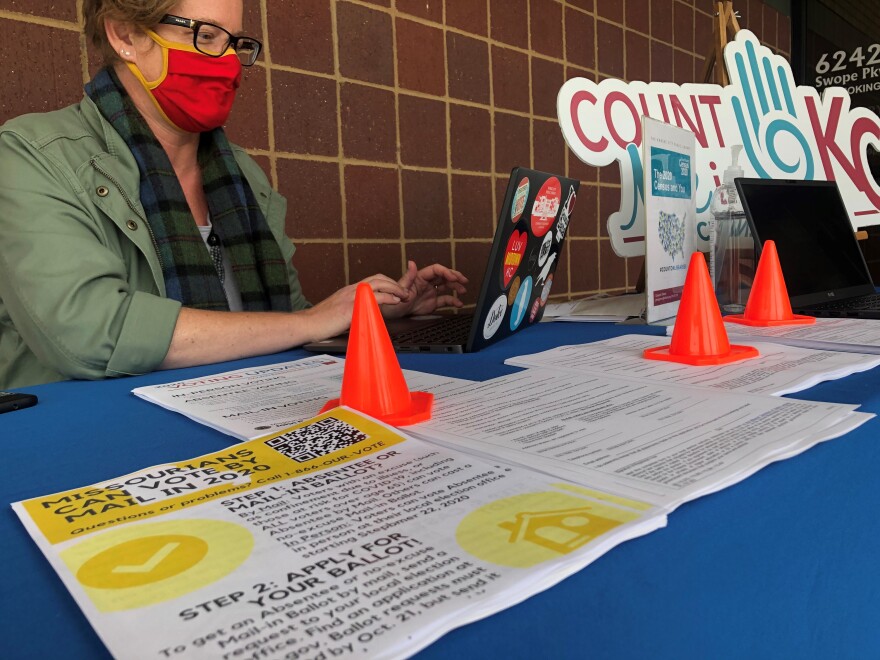With less than three weeks left until the national deadline to complete the 2020 U.S. Census, volunteers and advocates are scrambling to get Kansas City-area residents to complete the form.
Door-to-door efforts are helping boost responses. According to the Census Bureau, Kansas is now in the top five states in total responses with a rate of 95.6%. And Missouri’s rate is 92.7%.
But Jenny Garmon, legal and government specialist for the Kansas City Public Library, says Kansas City itself is still lagging behind. The self-response rate in Kansas City, Missouri, is slightly less than 60%, compared to a statewide self-response rate of 65%.
Kansas City Councilwoman Ryana Parks-Shaw says she’s worried communities that rely on programs like Medicaid, Children's Health Insurance Program (CHIP) and the Supplemental Nutrition Assistance Program (SNAP) are still being missed.
“People have other things that they’re concerned about and aren’t really thinking about the census right now,” Parks-Shaw said.
She also believes the pandemic only underscores how important it is to have an accurate count. Had Kansas City been fully counted in the 2010 Census, it would have received more federal aid to fight the virus.
The White House's decision to end 2020 Census counting efforts on Sept. 30 only adds to Parks-Shaw's concerns; that decision has been challenged in federal court.
Billions of dollars in federal funds are distributed for hospitals, roads, and schools based on census data. And Garmon tries to underscore those real-life impacts of an undercount.
The 2010 undercount resulted in the loss of a congressional seat for Missouri.
“And there is an estimate out there that we lost out on $79 billion in federal funds … that should have come to Missouri if we had been properly, accurately counted," she said. "That’s what we’re facing right now."
According to a study by George Washington University, federal spending programs recently used 2010 Census data to distribute more than $1.5 trillion to state and local governments, nonprofits, businesses and households nationwide.
Federal food assistance programs like SNAP rely on Census data. The Federal Emergency Management Agency uses housing data from the U.S. Census Bureau to deliver relief to residents after a natural disaster.
Garmon said the pandemic and distrust of the federal government have stymied efforts to boost self-responses, particularly in areas that are struggling with food and housing insecurity as a result of job losses.
On the Kansas side of the metro, responses are much stronger.
Johnson County has the highest self-response rate in the state, with a 78.8% of households filling out their forms online, by phone or by mail.
Kansas City, Kansas, is tracking closer to Kansas City, Missouri, with a self-response rate of 59.8%, according to the U.S. Census Bureau.
Emily Kelley is the U.S. Census Bureau partnership coordinator for Kansas and Oklahoma. She said in places where self-response rates are lower, enumerators have to work harder.
“We have had some enumerators from Kansas traveling to other states in our 12-state region that have lower self-response rates than we do, because it’s of vital importance that we get everyone counted,” Kelley says.
Still, Garmon said she’s heartened by grassroots groups that are trying to boost Census responses. She said she’s heard from people holding voter registration drives, like the Kansas City chapter of the Alpha Phi Alpha fraternity, who want to invite Census workers to their smaller events.
The Census Bureau has also participated in events with the school district, helping parents fill out their form as they wait to receive backpacks and school supplies.
She said the next 20 days are about being visible in the community and being available to answer questions and assist people. Garmon is traveling across Kansas City with a laptop and Wi-Fi hot spot for people to fill out their forms.
“I would just really ask everybody to realize that this is your moment, this is your time. It’s 10 minutes or less for you to respond to the census. It will make a difference for you, for your entire community, for the next 10 years,” she said.
Households can still fill out the form online at my2020census.gov.




